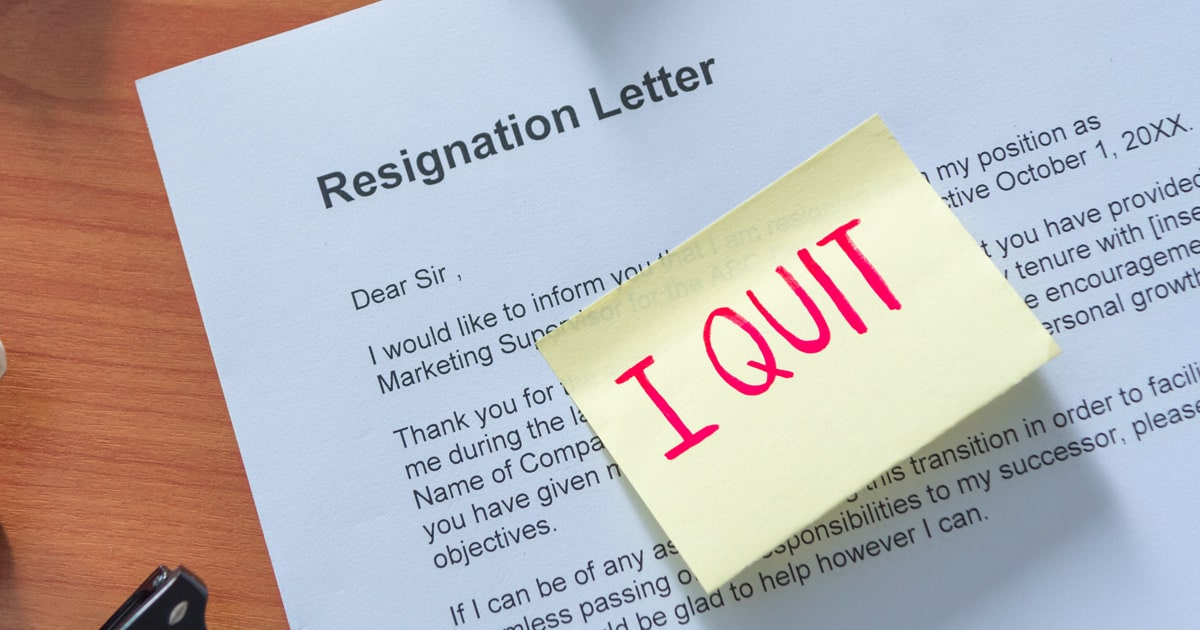At some point in our professional careers, we all have changed positions. When that time comes, how do you resign in a way that is professional and allows you to leave on good terms? Resigning from a job is a tense and stressful experience. Over time you have built relationships with your co-workers and supervisors so resigning can naturally cause anxiety: how will they react to the news? What if they respond negatively and get mad or upset?
Instead of worrying over a possible adverse reaction, remember that there are many simple things you can do to ensure that you resign on the best terms. Giving adequate notice, writing a resignation letter, and expressing gratitude towards your employer for the opportunities they provided you with are great ways to ensure that you leave a good impression behind. Below we share the best tips on what not to do and do so that you can resign gracefully.
Note: Resigning on good terms is especially important in smaller job markets, such as Cyprus and Malta. Maintaining positive relationships with past colleagues is essential because of three reasons. First, you’ll want to be able to ask your previous employer for a favorable recommendation before you leave. Second in smaller professional networks, it is easy for your reputation to precede you, so you don’t want your new employer to have a negative impression of you before you even begin working for them. Finally, you may end up returning to an old employer or may re-encounter former supervisors at your new job. Therefore, creating and maintaining positive working relationships ensures that you always have positive work experience.
When to Resign From a Job
Knowing when to resign from a job is crucial for both personal and professional growth. If you feel unfulfilled, undervalued, or find that your work no longer aligns with your career goals, it might be time to move on. Persistent stress, lack of work-life balance, or toxic workplace environments are also strong indicators that it’s time to resign. Additionally, if there are no opportunities for advancement or your current role no longer challenges you, seeking new opportunities elsewhere can be the right step. Ultimately, resigning should be a decision made after careful consideration of your well-being and future aspirations.
How to Resign From a Job
To resign professionally, schedule a private meeting with your manager and clearly state your intention to leave, giving the standard two-week notice or the period specified in your contract. Express gratitude for the opportunities you had, remain positive, and offer to help with the transition. Follow up with a formal resignation letter outlining your last working day. Maintain your work ethic during the notice period, and leave on good terms to preserve relationships and your reputation.
Do Quit in Person
Whether you have a good or bad relationship with your manager, make sure you quit in person. Your boss has invested time and resources into your growth so resigning through email, leaving a letter on their desk, or through human resources can make you seem ungrateful. An in-person conversation is the best way to show your respect and appreciation.
Bonus Tip: Prepare your manager by sending an email saying that you’ll like to discuss with them your future at the company. By giving them time to process the possibility of your resignation, they’ll be less reactive as they won’t be blind sighted (blindsided) by the news.
Don’t Tell Your Colleagues First
We often have closer relationships with colleagues than with our bosses. Therefore, it can be tempting to share the news with your closest colleagues before telling your boss. Co-workers knowing before management can be harmful as this can create office rumours notifying your boss of your decision before you can even contact them for a meeting about it.
Indirectly learning about your resignation can cause your manager to feel disrespected and lead to a heated conversation when you finally share the news with them. You will damage your reputation and hurt your chances of getting a positive recommendation.
Do Give Adequate Notice
Everybody has heard of the two-weeks’ notice, but some companies may require more so make sure to check your contract to ensure that you are following company policies. Replacing staff can be a costly and a time-consuming procedure, so the more notice you give, the easier the hiring process will be for your employers.
Bonus Tip: If you are someone in a supervisory or managerial role, you’ll want to submit your resignation with a 4-6-week notice. Giving sufficient notice to the hiring manager will provide them with enough time to find an experienced replacement that can handle the more complicated responsibilities of a managerial role. If your substitute is the right fit, you’ll ensure that your previous employer doesn’t have to rush the hiring process to cover your workload and avoid receiving the blame for any hiring mishaps due to you giving them too short of a notice.
Don’t Let out Your True Feelings or Thoughts
Giving your resignation is not the time to tell your boss or colleagues how much you disliked them. Both your resignation letter and exit interview should focus on the positive experiences you’ve had, such as how much the role has taught you. Speaking your mind will feel great at the moment, but you will quickly regret it. Not only will you lose their recommendation, but also your image as a professional.
Keep your resignation letter short and straight to the point. You only need to include that you are resigning, when your last workday is, and a brief statement expressing your appreciation for the opportunity.
Do Offer to Train Your Replacement
If you have the opportunity, then offer to help train your replacement. By offering your assistance, you will be able to accomplish various things. First, by training your replacement, you will make the transition into your old role smoother and quicker. The quicker your replacement can fulfil your role’s responsibilities, the faster your former team regains some of their lost productivity that resulted from your resignation. Moreover, it will show your employer that you appreciated working with them and leave them with a positive impression of you.
Bonus Tip: Even when you can’t directly train your replacement, you can still write them a comprehensive guide that highlights the critical tasks, contacts, and advice. Both your company and replacement will certainly appreciate your generosity.
Don’t Forget to Say Goodbye
Your direct teammates are often the closest people to you at work, so they deserve to hear directly from you about the change in your career. Before leaving take a few minutes to send a farewell email that highlights some of the positive experiences you’ve shared with each of the team members. Make sure to include your contact information so that you can keep in touch.
Resignation Letter Sample
Dear [Manager’s Name],
Please accept this letter as formal notification of my intention to resign from my position as [job title] with [company name]. In accordance with my notice period, my final day will be [date of last day].
I would like to thank you for the opportunity to have worked in the position for the past [time in employment]. I have learned a great deal during my time here and have enjoyed collaborating with my colleagues. Additionally, I will take a lot of what I have learned with me in my career and will look back at my time here as a valuable period of my professional life.
During the next [notice period in weeks] I will do what I can to make the transition as smooth as possible and will support in whatever way I can to hand over my duties to colleagues or to my replacement. Please let me know if there is anything further, I can do to assist in this process.
Thank you again for the opportunity to be a part of [Company Name]. I wish you and the entire team continued success.
Sincerely,
[Your Name]
Gracefully quitting your job is a process that requires thought and execution. It becomes even more difficult when you are part of smaller job markets such as Cyprus and Malta. If you wish to do what is best for your career, you must ensure that you have a smooth transition out of your old company.
By showing respect and gratitude towards your managers and company, you can leave any position with your reputation and network intact.

